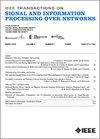通过事件触发通信实现一类受干扰线性多代理系统的完全分布式共识控制
IF 3
3区 计算机科学
Q2 ENGINEERING, ELECTRICAL & ELECTRONIC
IEEE Transactions on Signal and Information Processing over Networks
Pub Date : 2024-03-11
DOI:10.1109/TSIPN.2024.3375612
引用次数: 0
摘要
本文关注事件触发通信条件下一类受干扰一般线性多代理系统的全分布式共识控制问题。与现有研究不同的是,本文所考虑的干扰更加实际和复杂。每个代理都会受到外系统产生的干扰,而且每个外系统都被认为存在可能的建模误差。首先,为每个代理设计了一个局部扰动观测器,以补偿潜在的无界外部扰动,使其处于有界状态,但由于建模误差的上限未知,因此无法获得该界值。其次,进一步提出了一种具有完全干扰抑制功能的自适应共识控制法则,通过这种法则,共识误差会随着时间的推移趋于零。第三,在通信资源有限的情况下,设计了一种事件触发通信机制,用于决定代理何时广播信息,从而有效地节省了通信资源,同时确保实现最初的控制目标。此外,还证明了芝诺行为的排除。最后,通过一个仿真实例验证了理论结果的正确性。本文章由计算机程序翻译,如有差异,请以英文原文为准。
Fully Distributed Consensus Control for a Class of Disturbed Linear Multi-Agent Systems Over Event-Triggered Communication
This article is concerned with the fully distributed consensus control problem of a class of disturbed general linear multi-agent systems under event-triggered communication. Different from existing works, the disturbances considered in this article are more practical and complex. Each agent is subject to disturbances generated by exosystems and each exosystem is considered to exist with possible modelling errors. First, a local disturbance observer is designed for each agent to compensate potentially unbounded external disturbances to a bounded situation, but the value of this bound is not accessible because the upper bound of the modelling error is unknown. Second, an adaptive consensus control law with complete disturbance rejection is further proposed, by which the consensus error converges to zero over time. Third, with limited communication resources, an event-triggered communication mechanism is designed for deciding when an agent broadcasts information, which effectively saves communication resources while ensuring that the original control goal is achieved. In addition, it is demonstrated that Zeno behaviour is excluded. Finally, the correctness of the theoretical results is verified by a simulation example.
求助全文
通过发布文献求助,成功后即可免费获取论文全文。
去求助
来源期刊

IEEE Transactions on Signal and Information Processing over Networks
Computer Science-Computer Networks and Communications
CiteScore
5.80
自引率
12.50%
发文量
56
期刊介绍:
The IEEE Transactions on Signal and Information Processing over Networks publishes high-quality papers that extend the classical notions of processing of signals defined over vector spaces (e.g. time and space) to processing of signals and information (data) defined over networks, potentially dynamically varying. In signal processing over networks, the topology of the network may define structural relationships in the data, or may constrain processing of the data. Topics include distributed algorithms for filtering, detection, estimation, adaptation and learning, model selection, data fusion, and diffusion or evolution of information over such networks, and applications of distributed signal processing.
 求助内容:
求助内容: 应助结果提醒方式:
应助结果提醒方式:


